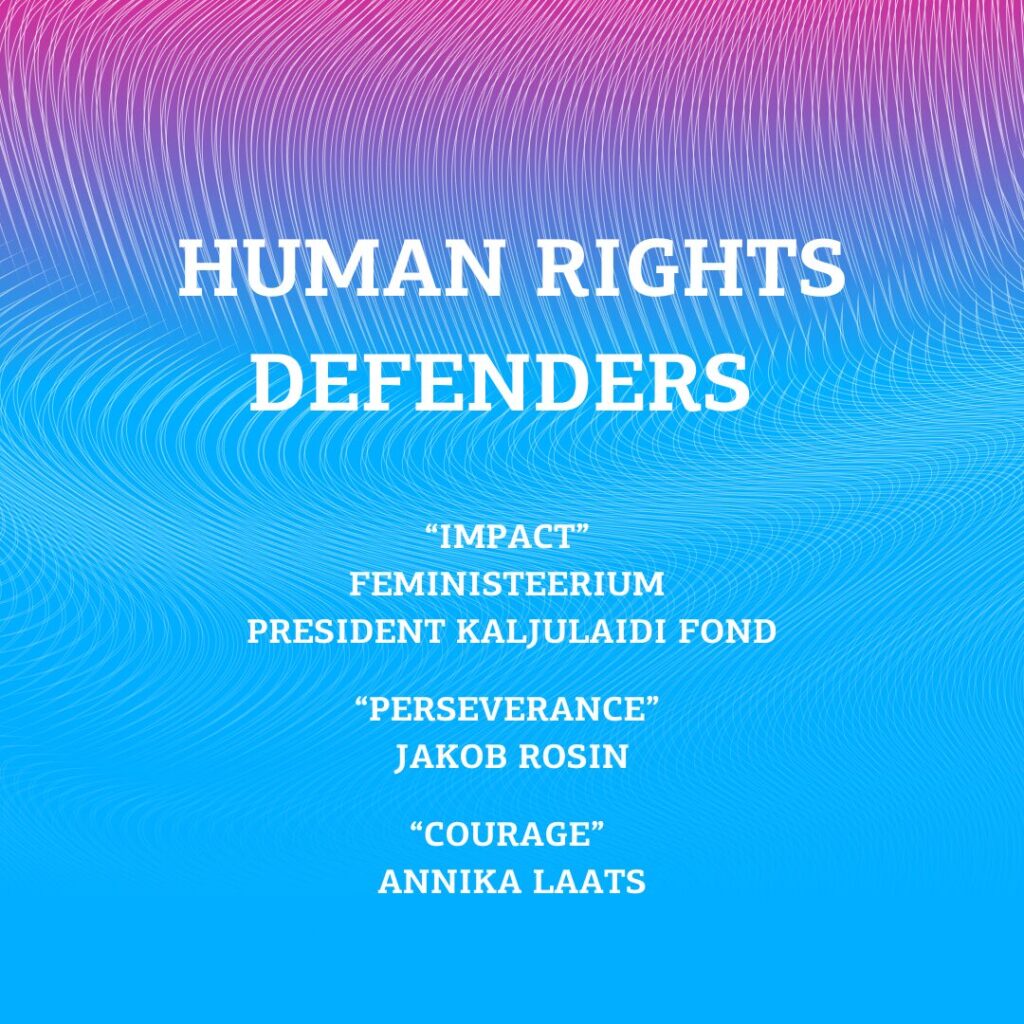Assessing the past year is challenging: it was neither entirely good nor entirely bad. However, looking at our work in 2024—new initiatives, the people we helped, those we trained, and the support we received—alongside the numbers reflecting these efforts, there is little reason to complain.
 Over the year, we had nine full-time employees. In May, Nora joined us to advocate for refugee rights, while two colleagues moved on to new challenges. We thank Kertu and Helen for their contributions to human rights and wish them success! At the beginning of the year, a new member, Klemens, joined the EHRC’s council, helping to shape our long-term goals.
Over the year, we had nine full-time employees. In May, Nora joined us to advocate for refugee rights, while two colleagues moved on to new challenges. We thank Kertu and Helen for their contributions to human rights and wish them success! At the beginning of the year, a new member, Klemens, joined the EHRC’s council, helping to shape our long-term goals.
On average, we had 14 projects running simultaneously, supporting our strategic objectives. We also launched new initiatives, including employment counseling for Ukrainians, addressing AI-related threats to human rights, and two youth empowerment projects—one supporting the integration of Ukrainian youth and another helping youth workers create a safe environment for LGBT+ youth.
Anyone familiar with civil society work knows that ensuring sustainability requires integrating project writing into daily tasks, planning at least two years ahead, and accepting that not all applications will succeed. To ensure that human rights continue to be protected in Estonia, we submitted 17 project applications over the year.
Our primary task is defending people’s rights, which we do through counseling and litigation. Over the year, we provided legal guidance to nearly 500 individuals, mainly on international protection, equal treatment, and labor exploitation. Refugee lawyers were primarily approached regarding asylum extensions, deportation risks, and family reunification. In the second half of 2024, we focused on employment exploitation of Ukrainians. To our surprise, we encountered severe cases, including workplace accidents where employers refused to take responsibility for injuries, non-payment of wages, and wrongful terminations.
In equal treatment cases, those who sought our advice faced issues related to gender and sexual harassment, the rights of people with disabilities, and workplace disputes. We also provided guidance on hate crimes and assisted employers in developing anti-harassment policies for their organizations.
Over the year, we handled 24 court cases, including 17 new cases and five strategic ones. Most cases were in the field of international protection, focusing on upholding the rule of law. Additionally, we are handling cases on whistleblowing related to harassment and freedom of expression, with a Supreme Court ruling on the latter expected in March. We won a case where the court ruled that the absence of a military service card does not prevent the granting of a residence permit. Since litigation is costly and public attention can be overwhelming, our future challenge remains identifying strategic cases and empowering victims to defend their rights.
Our year in the diversity and inclusion field was successful. We celebrated Diversity Month with a conference titled “From Cultural Conflict to Innovation”, evaluated organizations applying for the Diversity Label, and awarded 60 organizations with well-earned Diversity Labels. Although employers are increasingly committed to improving workplace culture and addressing issues, the Ministry of Economic Affairs and Communications unexpectedly canceled funding for the next Diversity Label cycle without providing a reason. Recognizing its importance, we will continue our work and develop a new Diversity Label concept in 2025 in collaboration with network members.
Over the year, 29 organizations joined the Diversity Charter, expanding the network of organizations committed to respecting diversity and ensuring equal treatment to 229 members.
More than 1,000 people participated in our trainings and seminars, primarily on diversity and inclusion. We covered topics such as accessibility, safe work environments, women’s empowerment, and equal treatment. We also organized seminars for lawyers and NGOs on the EU Charter of Fundamental Rights, gender and sexual minorities, and the roots of hate and intolerance.
As 2024 was a European Parliament election year, we wanted our supporters to make values-based choices. We conducted a survey on key human rights topics, publishing the results on our website—our most-read news item of the year. On Europe Day, we hosted a debate with European Parliament candidates at Freedom Square and co-organized another debate at Tammsaare Park. To strengthen the presence of European values in courts, we created a dedicated webpage on the EU Charter of Fundamental Rights, featuring cases where the Charter has been applied.
In the media, we discussed the situation of Ukrainian war refugees in Estonia, the dangers of restricting freedom of assembly, gender issues, and more. Recognizing the increasing importance of social media in communication, we commissioned a social media audit and updated our visual identity.
We were also actively engaged in advocacy at both local and international levels. Our Equal Treatment Network, which we lead, provided feedback on hate crime and hate speech legislation, gender equality and equal opportunities bills, and supported the yes-model in consent law.
Internationally, we contributed to networks such as European Liberties Union, European Asylum Law Network, European Anti-Racism Network, International Network Against Cyberhate.
We are proud that 2024 was our strongest year for fundraising, including receiving the largest single donation in our history. Donations were used for strategic litigation, co-financing projects, and maintaining a financial buffer to navigate challenging times. Thank you to all 361 donors! Additionally, seven interns contributed to our work by monitoring hate speech on social media, researching country-of-origin information for asylum seekers, and conducting preparatory work for project applications.
To recognize those who stand alongside us in defending human rights in Estonia, we launched a new tradition in 2024—awarding Human Rights Defenders. This biennial honor highlights outstanding contributions:
- The “Võnge” (Impact) Award went to Feministeerium and President Kaljulaid’s Foundation
- The “Visadus” (Perseverance) Award was presented to Jakob Rosin
- The “Julgus” (Courage) Award was given to Annika Laats
Thank you again—we deeply appreciate your work!
The start of 2025 has not been difficult only for the U.S.. The U.S. presidential administration’s executive orders have affected millions in need worldwide. Unfortunately, as always, the most vulnerable suffer the most. The decision to halt U.S. international aid has already had devastating consequences. This is a stark reminder that human rights must be defended at all times and that no victory for a more equal society is ever final. The work must continue today, and support for human rights must be stronger than ever. Without strong organizations advocating for human rights, who will stand up when it matters most?
Since you are here...
It is important to protect everyone’s human rights, because it helps to keep stability and peace in the society. There are many challenges for protection of human rights in Estonia: intolerance has really come out of the closet. Bad things happen when good people are too passive, but together we can make a change.
Estonian Human Rights Centre is the competent, accountable and impactful independent human rights organisation in Estonia. Your recurring or one-time donation helps to stand up for human rights everywhere: in courts, in the media, in schools, in the workplace, on the streets and in governmental venues.
Donating is easy, and you can use your credit card if donating from abroad.
Donate now







